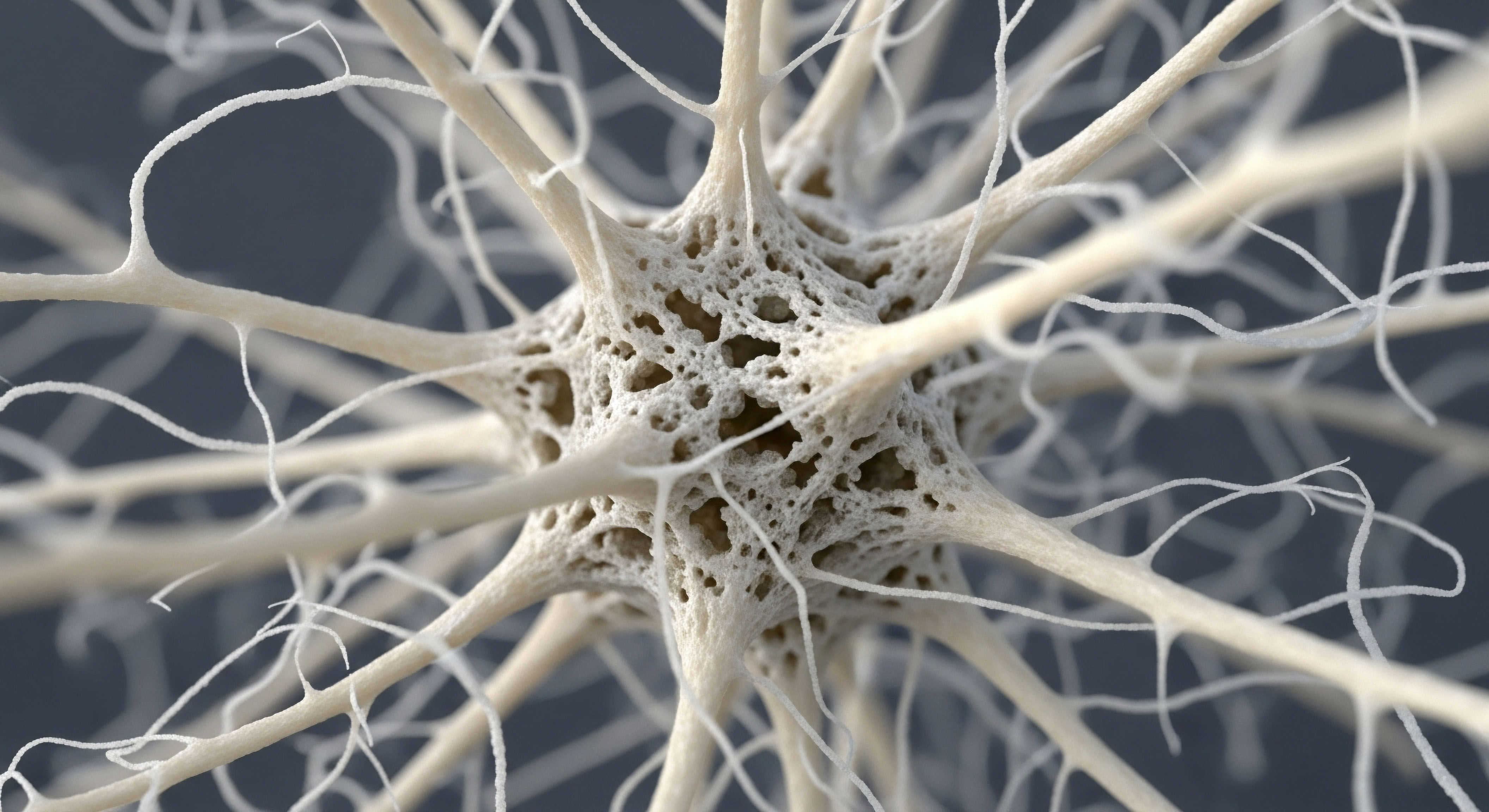

Fundamentals
Have you found yourself pausing mid-sentence, searching for a word that once came effortlessly? Perhaps you experience moments of mental fog, a subtle slowing of thought, or a diminished capacity for tasks that previously felt simple. These experiences, often dismissed as “just aging,” can be unsettling, even disorienting.
They are not merely isolated incidents; they represent a deeper conversation your body is attempting to have with you about its internal messaging systems. Understanding these shifts is the first step toward reclaiming your cognitive clarity and overall vitality.
Many women attribute these changes solely to estrogen fluctuations during perimenopause and postmenopause. While estrogen certainly plays a significant role in brain health, another vital biochemical messenger, testosterone, often goes overlooked in discussions about female well-being. This hormone, present in smaller yet potent quantities in women, acts as a conductor in a complex biological orchestra, influencing far more than just libido.
It contributes to energy levels, muscle strength, bone density, and a stable mood. Its presence, or absence, can profoundly shape how you experience your daily life, including the sharpness of your mind.
As women progress through their reproductive years and beyond, a natural decline in various hormone levels occurs. This includes a gradual reduction in testosterone production by the ovaries and adrenal glands. This decline is not a sudden event; it is a progressive shift that can subtly alter the body’s internal equilibrium. When this balance is disrupted, the intricate communication networks within the body, including those supporting brain function, can become less efficient.
Cognitive shifts in aging women are often linked to a decline in testosterone, a vital hormone influencing brain function beyond its common associations.
The brain, a highly metabolically active organ, relies on a consistent supply of these biochemical signals to maintain its intricate operations. When testosterone levels diminish, the brain’s capacity for certain functions can be compromised. This can manifest as the memory lapses, reduced processing speed, or difficulties with focus that many women report. Recognizing these symptoms as potential indicators of hormonal imbalance offers a path toward targeted support, moving beyond the acceptance of an inevitable decline.
Considering the broad influence of testosterone, its role in maintaining cognitive resilience warrants careful consideration. It is not about turning back the clock to a younger state, but rather about recalibrating your biological systems to support optimal function as you age. This perspective acknowledges your lived experience while offering evidence-based avenues for intervention.

The Endocrine System’s Influence on Cognition
The endocrine system, a network of glands that produce and release hormones, acts as the body’s master communication hub. Hormones serve as messengers, traveling through the bloodstream to target cells and tissues, instructing them on various physiological processes. When these messages are clear and consistent, the body operates with precision. When they become muddled or insufficient, systemic function can falter.
Cognitive function, encompassing memory, attention, problem-solving, and executive function, is profoundly influenced by this hormonal symphony. Hormones like estrogen, progesterone, and testosterone interact in complex ways within the brain. They affect neurotransmitter synthesis, neuronal growth, and synaptic plasticity ∞ the brain’s ability to reorganize and form new connections. A reduction in any one of these key players can impact the overall harmony of brain activity.

Testosterone’s Role in Brain Health
Testosterone’s contribution to female brain health extends beyond its more commonly discussed effects. It influences several critical aspects of cognitive vitality:
- Neurotransmitter Modulation ∞ Testosterone can impact the production and sensitivity of neurotransmitters such as acetylcholine, which is crucial for memory and learning, and dopamine, associated with motivation and reward.
- Neuronal Protection ∞ It possesses neuroprotective properties, helping to shield brain cells from damage and supporting their longevity.
- Energy Metabolism ∞ This hormone plays a part in cellular energy production, ensuring brain cells have the fuel they need to operate efficiently.
- Mood Regulation ∞ Stable testosterone levels contribute to emotional well-being, reducing symptoms of anxiety and depression that can indirectly impair cognitive performance.
Understanding these foundational connections between hormonal balance and cognitive well-being provides a compelling reason to explore personalized wellness protocols. It shifts the conversation from passive acceptance of age-related changes to proactive engagement with your body’s intricate systems.


Intermediate
Recognizing the potential influence of testosterone on cognitive function leads naturally to considering how its levels might be optimized. This involves a precise, clinically informed approach, tailored to the individual’s unique biochemical landscape. Hormonal optimization protocols are not a one-size-fits-all solution; they represent a careful recalibration of the body’s internal communication system, aiming to restore balance and support systemic health.
For women experiencing symptoms associated with declining testosterone, such as diminished mental acuity, fatigue, or reduced vitality, a targeted intervention can be considered. This typically involves the administration of exogenous testosterone, often in conjunction with other hormonal support, to bring levels back into a physiological range. The goal is to mimic the body’s natural production as closely as possible, ensuring a harmonious effect across various systems.

Female Testosterone Optimization Protocols
The administration of testosterone for women differs significantly from male protocols, reflecting the distinct physiological requirements and hormonal balance in the female body. Precision in dosing and monitoring is paramount to achieving therapeutic benefits without undesirable side effects.

Testosterone Cypionate Administration
One common method involves the use of Testosterone Cypionate, a long-acting ester of testosterone. This is typically administered via subcutaneous injection, a method that allows for consistent absorption and stable blood levels.
- Dosage ∞ A typical starting dose for women ranges from 10 to 20 units (equivalent to 0.1 ∞ 0.2 ml) administered weekly. This low-dose approach is crucial for avoiding supraphysiological levels, which could lead to androgenic side effects.
- Administration Frequency ∞ Weekly injections help maintain steady hormone concentrations, preventing the peaks and troughs that can occur with less frequent dosing.
- Monitoring ∞ Regular blood tests are essential to monitor total testosterone, free testosterone, and estradiol levels. This allows for precise dose adjustments, ensuring the therapeutic window is maintained.
The rationale behind these specific dosages and frequencies relates to the body’s feedback mechanisms. Administering small, consistent amounts helps the body gradually adapt and integrate the exogenous hormone, supporting its natural communication pathways without overwhelming them.

Progesterone and Estrogen Balance
Testosterone optimization in women rarely occurs in isolation. The endocrine system operates as an interconnected network, and supporting one hormone often necessitates considering others. Progesterone, a vital female hormone, is frequently prescribed alongside testosterone, particularly for peri-menopausal and post-menopausal women.
Progesterone plays a role in mood regulation, sleep quality, and uterine health. Its inclusion in a hormonal optimization protocol helps maintain a balanced hormonal environment, mitigating potential imbalances that could arise from testosterone administration alone. For women with intact uteruses, progesterone is also crucial for protecting the uterine lining when estrogen is present.
In some instances, particularly with higher testosterone doses or individual metabolic variations, testosterone can convert into estrogen. While some estrogen is beneficial, excessive conversion can lead to undesirable effects. In such cases, an aromatase inhibitor like Anastrozole might be considered.
Anastrozole works by blocking the enzyme aromatase, which is responsible for converting androgens (like testosterone) into estrogens. This helps maintain a favorable testosterone-to-estrogen ratio, supporting the overall hormonal equilibrium. Its use is carefully evaluated based on individual lab results and symptom presentation.
Precise, individualized testosterone optimization for women involves low-dose injections, careful monitoring, and often includes progesterone to maintain hormonal balance.

Pellet Therapy as an Option
Beyond weekly injections, pellet therapy offers an alternative for testosterone administration. This method involves the subcutaneous insertion of small, custom-compounded pellets, typically in the hip or gluteal area. These pellets slowly release testosterone over several months, providing a sustained and consistent hormone delivery.
Pellet therapy can be a convenient option for women seeking to avoid frequent injections. The slow-release mechanism helps maintain stable hormone levels, which can be beneficial for consistent symptom management and cognitive support. As with injections, monitoring blood levels and considering co-medications like Anastrozole, if indicated, remains essential with pellet therapy.

Monitoring and Adjusting Protocols
A cornerstone of any effective hormonal optimization strategy is rigorous monitoring. This involves periodic blood tests to assess hormone levels and other relevant biomarkers. The results guide adjustments to dosages and protocols, ensuring the treatment remains aligned with the individual’s physiological needs and therapeutic goals.
Typical lab parameters monitored include:
| Lab Parameter | Clinical Significance for Women | Target Range (General Guidance) |
|---|---|---|
| Total Testosterone | Overall circulating testosterone level. | 25-50 ng/dL |
| Free Testosterone | Biologically active testosterone, unbound to proteins. | 0.5-2.0 pg/mL |
| Estradiol (E2) | Primary estrogen, monitored for conversion from testosterone. | < 50 pg/mL (post-menopausal) |
| Sex Hormone Binding Globulin (SHBG) | Protein that binds sex hormones; influences free hormone levels. | Varies; impacts free testosterone. |
| Complete Blood Count (CBC) | Monitors red blood cell count; testosterone can increase hematocrit. | Within normal limits. |
These values, combined with a thorough assessment of symptoms and overall well-being, allow for a truly personalized approach. The aim is not simply to achieve a number on a lab report, but to restore the body’s capacity for optimal function, including its cognitive processes.

How Does Hormonal Recalibration Aid Cognitive Function?
The precise administration of testosterone, along with supportive hormones, helps to re-establish a more robust hormonal signaling system within the brain. This recalibration can support neuronal health and function through several pathways:
- Enhanced Neurotransmitter Synthesis ∞ Adequate testosterone levels can support the brain’s ability to produce and utilize key neurotransmitters involved in memory, focus, and mood.
- Improved Cerebral Blood Flow ∞ Hormonal balance can influence vascular health, potentially improving blood flow to the brain, which is vital for nutrient and oxygen delivery.
- Reduced Neuroinflammation ∞ Testosterone possesses anti-inflammatory properties that can help mitigate chronic low-grade inflammation in the brain, a factor implicated in cognitive decline.
- Support for Synaptic Plasticity ∞ By supporting the structural integrity and adaptability of neuronal connections, optimized hormone levels can bolster the brain’s capacity for learning and memory formation.
These interconnected mechanisms illustrate how a targeted hormonal intervention can contribute to a more resilient and functional cognitive landscape. It is a proactive step toward supporting the brain’s long-term health and maintaining mental sharpness as the years progress.

Can Hormonal Optimization Protocols Be Applied Proactively?
The question of proactive application of hormonal optimization protocols, particularly for cognitive resilience, is a significant area of discussion. While most interventions are initiated in response to symptomatic decline, a growing understanding of preventative health suggests that maintaining physiological hormone levels could support long-term cognitive vitality. This involves regular monitoring and a personalized assessment of risk factors and individual health goals.


Academic
The intricate relationship between sex steroids and central nervous system function represents a compelling area of scientific inquiry. Moving beyond the clinical application, a deeper exploration into the molecular and cellular mechanisms by which testosterone influences cognitive processes in women reveals a sophisticated interplay of biological axes and signaling pathways. This academic perspective grounds the observed clinical benefits in fundamental neurobiology, providing a comprehensive understanding of testosterone’s neurotrophic and neuroprotective roles.
Testosterone, often perceived primarily as an androgen, exerts its cognitive effects through multiple avenues within the brain. These include direct binding to androgen receptors (ARs), conversion to estradiol via the aromatase enzyme and subsequent binding to estrogen receptors (ERs), and modulation of various neurotransmitter systems. The brain itself is a significant site of steroid synthesis and metabolism, underscoring its capacity for local hormonal regulation.

Neurobiological Mechanisms of Testosterone Action
The brain contains a widespread distribution of both androgen and estrogen receptors, particularly in regions critical for cognitive function. These include the hippocampus, essential for memory formation; the prefrontal cortex, involved in executive functions and decision-making; and the amygdala, which plays a role in emotional processing and memory consolidation.
When testosterone binds to its receptors, or when its metabolite estradiol binds to estrogen receptors, a cascade of intracellular events is initiated. These events can influence gene expression, protein synthesis, and neuronal morphology.
- Synaptic Plasticity and Neurogenesis ∞ Testosterone and its metabolites support synaptic plasticity, the ability of synapses to strengthen or weaken over time in response to activity. This is a fundamental mechanism underlying learning and memory. Evidence suggests that testosterone can promote neurogenesis, the birth of new neurons, particularly in the hippocampus, a region vital for episodic memory.
- Neurotransmitter System Modulation ∞ Testosterone influences the synthesis, release, and reuptake of key neurotransmitters. It can enhance cholinergic activity, crucial for attention and memory, and modulate dopaminergic and serotonergic systems, which are involved in mood, motivation, and executive function. A balanced neurotransmitter profile is essential for optimal cognitive processing.
- Anti-inflammatory and Antioxidant Effects ∞ Chronic low-grade inflammation and oxidative stress are implicated in age-related cognitive decline and neurodegenerative processes. Testosterone exhibits anti-inflammatory properties, reducing the production of pro-inflammatory cytokines within the brain. It also acts as an antioxidant, mitigating cellular damage caused by reactive oxygen species.
- Cerebral Blood Flow and Glucose Metabolism ∞ Testosterone can influence cerebrovascular health, potentially improving cerebral blood flow and glucose utilization by brain cells. Adequate blood supply and energy metabolism are prerequisites for sustained cognitive performance.
Testosterone impacts female cognition by supporting synaptic plasticity, modulating neurotransmitters, reducing neuroinflammation, and enhancing cerebral blood flow.

Interplay with Other Endocrine Axes
The impact of testosterone on cognitive function cannot be isolated from its interactions with other major endocrine axes. The Hypothalamic-Pituitary-Gonadal (HPG) axis, which regulates sex hormone production, is intricately linked with the Hypothalamic-Pituitary-Adrenal (HPA) axis, governing the stress response, and the Hypothalamic-Pituitary-Thyroid (HPT) axis, controlling metabolism.
Chronic stress, mediated by the HPA axis and elevated cortisol levels, can negatively impact hippocampal function and neurogenesis, potentially exacerbating cognitive decline. Balanced testosterone levels may offer a degree of resilience against these stress-induced cognitive impairments. Similarly, thyroid hormones are critical for brain development and function, and their optimal levels are synergistic with sex hormone balance for cognitive health.
The metabolic system also plays a significant role. Insulin resistance and dysregulated glucose metabolism are increasingly recognized as contributors to cognitive impairment. Testosterone has been shown to influence insulin sensitivity and glucose homeostasis, suggesting an indirect pathway through which its optimization could support brain metabolic health and, consequently, cognitive function.

Testosterone and Neurodegenerative Processes
While research is ongoing, preclinical and some clinical studies suggest a potential role for testosterone in mitigating aspects of neurodegenerative processes. For instance, some investigations explore its influence on amyloid-beta plaque formation and tau protein phosphorylation, hallmarks of Alzheimer’s disease. The neuroprotective and anti-inflammatory actions of testosterone could theoretically offer a buffer against the progression of such pathologies, though more extensive human trials are needed to confirm these findings definitively.
| Brain Region | Primary Cognitive Function | Testosterone’s Potential Influence |
|---|---|---|
| Hippocampus | Memory formation, spatial navigation. | Supports neurogenesis, synaptic plasticity, neuronal survival. |
| Prefrontal Cortex | Executive functions, working memory, decision-making. | Modulates dopamine and acetylcholine, influences attention and planning. |
| Amygdala | Emotional processing, fear memory. | Contributes to mood stability, potentially impacting emotional memory. |
| Basal Forebrain | Source of cholinergic projections to cortex and hippocampus. | May enhance cholinergic neuron health and neurotransmitter release. |
The academic lens reveals that testosterone optimization in women is not merely about addressing a single symptom. It represents a sophisticated intervention aimed at supporting the fundamental biological processes that underpin cognitive resilience. By understanding these deep-seated mechanisms, individuals can make informed decisions about personalized wellness protocols, moving toward a future of sustained mental acuity.

Future Directions in Research
Ongoing research continues to refine our understanding of testosterone’s full spectrum of effects on the female brain. Longitudinal studies are crucial for establishing definitive links between long-term testosterone optimization and cognitive outcomes. Investigations into genetic predispositions that influence individual responses to testosterone therapy, as well as the optimal timing and duration of intervention, represent significant areas of future inquiry. This continuous scientific exploration ensures that clinical practices remain grounded in the most current and robust evidence.

References
- Davis, Susan R. et al. “Testosterone in Women ∞ The Clinical Significance.” The Lancet Diabetes & Endocrinology, vol. 3, no. 12, 2015, pp. 980-992.
- Genazzani, Andrea R. et al. “Testosterone and the Brain ∞ From Neuroprotection to Cognition.” Journal of Steroid Biochemistry and Molecular Biology, vol. 145, 2015, pp. 12-22.
- Goyal, M. et al. “Role of Androgens in Cognition.” Current Opinion in Endocrinology, Diabetes and Obesity, vol. 20, no. 3, 2013, pp. 222-228.
- Sherwin, Barbara B. “Estrogen and Androgen Effects on Brain and Cognitive Function in Women ∞ A Narrative Review.” Journal of Clinical Endocrinology & Metabolism, vol. 101, no. 10, 2016, pp. 3695-3703.
- Boron, Walter F. and Emile L. Boulpaep. Medical Physiology. 3rd ed. Elsevier, 2017.
- Guyton, Arthur C. and John E. Hall. Textbook of Medical Physiology. 14th ed. Elsevier, 2020.
- The Endocrine Society. “Clinical Practice Guideline ∞ Androgen Therapy in Women.” Journal of Clinical Endocrinology & Metabolism, 2014.
- Resnick, Susan M. et al. “Longitudinal Effects of Endogenous Testosterone on Cognition in Older Men and Women.” Journal of Clinical Endocrinology & Metabolism, vol. 95, no. 1, 2010, pp. 358-367.

Reflection
Your personal health journey is a dynamic process, a continuous dialogue between your body’s innate wisdom and the insights gained from scientific understanding. The information presented here offers a lens through which to view age-related cognitive shifts, moving beyond simple acceptance to a place of informed action. Understanding the intricate role of hormones, particularly testosterone, in your cognitive vitality opens a pathway to proactive self-care.
Consider what these insights mean for your own experience. Do the described symptoms resonate with your daily life? Does the concept of hormonal recalibration align with your desire for sustained well-being? This knowledge is a powerful tool, yet it represents only the initial step. True optimization requires a personalized assessment, a careful evaluation of your unique biological blueprint, and guidance from a clinician who understands the complexities of endocrine health.
Your body possesses an incredible capacity for adaptation and restoration. By engaging with its signals and supporting its systems, you can actively shape your cognitive future, preserving mental acuity and living with a renewed sense of clarity and purpose.



